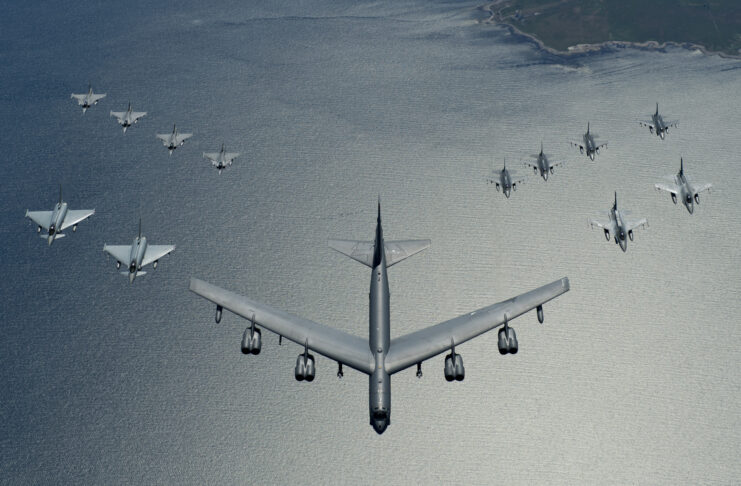ANALYSIS – One thing that these Russia apologists, or opponents of aiding Ukraine in its fight for survival, generally ignore is Vladimir Putin‘s hostile plans for other parts of Europe.
He is especially obsessed with reining in former Soviet colonies with large Russian-speaking populations. (RELATED: Poland On Track To Becoming Our Most Militarily Powerful NATO Ally)
And Putin doesn’t care if these countries are members of NATO or not. (RELATED: Is GOP Rep. Marjorie Greene Dangerously Uninformed On Russia – Or Just Playing Politics?)
Top on his target list are the three small Baltic states of Estonia, Latvia and Lithuania, all formerly occupied by the Soviet Union.
And, no, he isn’t planning to invade NATO members with their collective defense guarantees, including backing from the United States.
He isn’t insane.
What he does have, now substantiated by leaked documents, is a series of plans that outline how Russia can exert its influence to indirectly undermine and dominate these countries.
Or at least neutralize them and weaken the NATO presence in them.
The leaked files were obtained by the Swedish news outlet Expressen and others.
And while strategies outlined in these documents were likely drafted before Putin’s aggression in Ukraine, the plans do include the use of military pressure and intimidation.
Estonia’s foreign intelligence service recently said Russia could exert “credible military pressure” on the Baltic states. It also believes that Russia considers them to be “the most vulnerable part of NATO.”
This “would make them a focus of military pressure in the event of a NATO-Russia conflict,” the intelligence service noted.
But why are these states especially vulnerable?
For one, their size and energy dependency. (RELATED: Did Pro-Ukrainian Groups Sabotage Nord Stream Pipeline – Or Is This Misdirection?)
One strategy aims to use the dependence of the Baltic states on Russia’s electricity grid as leverage, just as it is still striving to influence Germany and others with its gas.
The Baltic states are currently part of BRELL, an electrical power grid controlled by Moscow.
But there is also the issue of their populations.
About 300,000 ethnic Russians live in Estonia, almost a quarter of the population. Likewise, 471,000 ethnic Russians reportedly live in Latvia, also 25% of its population.
140,000 Russians live in Lithuania, which is about 5% of its population.
Newsweek reports that:
The documents state that associations and organizations should be created that can covertly advance pro-Russian narratives and spread Russian culture. Propaganda should allege discrimination against Russian speakers and Russian-speaking students should be invited to Russia. Meanwhile, the demolition or relocation of Soviet-era World War II monuments should be prevented.
Newsweek adds that according to the Kremlin plans, the Russian language should be consolidated as a state language in Latvia by 2030.
The plans also mention the “containment of NATO” and the creation of a school at a Russian institute in the capital, “which will become a center for strengthening the position of the Russian language, literature and culture” by 2025. (RELATED: Putin Sending ‘Patriotic’ Teachers To Ukraine To ‘Russify’ Students In Captured Territories)
This now seems highly unlikely.
The same Russian leadership group that created these plans, the Russian Presidential Administration’s Directorate for Cross-Border Cooperation, previously developed another plan to incorporate Belarus into a “Union State” with Russia by 2030.

And Belarus does seem on track to be absorbed in a few years. (RELATED: Did Putin ‘Humiliate’ China’s Leader Xi By Deploying Nukes To Belarus?)
However, the invasion of Ukraine has created strong resistance to any Russian influence efforts in Europe – especially so in the Baltics.
Both Estonia and Latvia recently adopted reforms that will gradually prohibit Russian-language teaching in grammar schools.
And as Newsweek notes, Russia’s invasion has pushed the three Baltic states to fast-track the integration of their power grids with Europe at the beginning of 2026.
Still, the Russian goal remains – to reduce the NATO military presence in the former Soviet-occupied countries while at the same time strengthening Russian influence and culture.
Regardless of the outcome of the war in Ukraine, the West should remain vigilant to this ultimate Russian objective. (RELATED: Tit-For-Tat: Putin Ups The Ante With Plans To Station Nuclear Warheads On NATO’s Doorstep)
